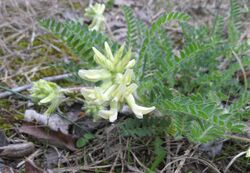Biology:Astragalus tennesseensis
| Astragalus tennesseensis | |
|---|---|

| |
| Scientific classification | |
| Kingdom: | Plantae |
| Clade: | Tracheophytes |
| Clade: | Angiosperms |
| Clade: | Eudicots |
| Clade: | Rosids |
| Order: | Fabales |
| Family: | Fabaceae |
| Subfamily: | Faboideae |
| Genus: | Astragalus |
| Species: | A. tennesseensis
|
| Binomial name | |
| Astragalus tennesseensis A.Gray ex. Chapm.
| |
Astragalus tennesseensis is a species of flowering plant in the legume family known by the common name Tennessee milkvetch. It is native to the United States, where it is known from Illinois, Indiana , Tennessee and Alabama.[1] Most of the occurrences are in Tennessee.[2]
This plant produces cream-colored flowers in April and May.[1] The seedlings grow slowly and several years pass before the plants reach reproductive maturity.[3] The species is adapted to drought, remaining metabolically active in habitat that is dry over the summer.[4]
This plant has been nearly extirpated from Illinois and Indiana, but it has been reintroduced there in a few select populations.[1] Some natural populations have been rediscovered in Illinois.[2]
The plant grows in cedar glades and glade ecotones[2] and open prairies.[1] It may be found in the partial shade of Juniperus virginiana,[5] but it does not tolerate heavy shade.[6]
This species is unique within genus Astragalus and it is the only species in section Tennesseensis.[6]
References
- ↑ 1.0 1.1 1.2 1.3 Astragalus tennesseensis. Center for Plant Conservation.
- ↑ 2.0 2.1 2.2 Astragalus tennesseensis.[yes|permanent dead link|dead link}}] The Nature Conservancy.
- ↑ Baskin, C. C., et al. (1972). Observations on the ecology of Astragalus tennesseensis. American Midland Naturalist 88(1) 167-82.
- ↑ Baskin, C. C. and J. M. Baskin. (1974). Responses of Astragalus tennesseensis to drought. Changes in free amino acids and amides during water stress and possible ecological significance. Oecologia 17(1) 11-16.
- ↑ Edwards, A. L., et al. (2004). Genetic diversity in Astragalus tennesseensis and the federal endangered Dalea foliosa (Fabaceae). Journal of the Torrey Botanical Society 131(4) 279-91.]
- ↑ 6.0 6.1 Baskin, J. M. and C. C. Baskin. (2005). Ecology of two geographically restricted Astragalus species (Fabaceae), A. bibullatus and A. tennesseensis, of the eastern United States. Brittonia 57(4):345-353.
External links
Wikidata ☰ Q4811300 entry
 |


